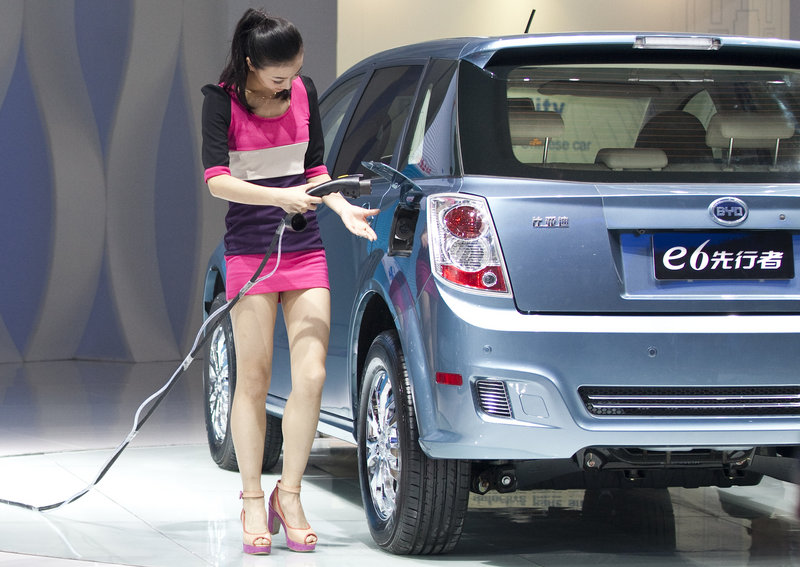BEIJING – China’s leaders are finding it’s a lot tougher to create a world-beating electric car industry than they hoped.
In 2009, they announced bold plans to cash in on demand for clean vehicles by making China a global power in electric car manufacturing. They pledged billions of dollars for research and called for annual sales of 500,000 cars by 2015.
Today, Beijing is scaling back its ambitions, chastened by technological hurdles and lack of buyer interest. Developers have yet to achieve breakthroughs and will be lucky to sell 2,000 cars this year, mostly taxis. The government has hedged its bets by broadening the industry’s official goals to include cleaner gasoline engines.
The government has repeatedly changed targets because the “technology isn’t advancing quite as fast as people had hoped,” said Joe Hinrichs, Ford Motor Co.’s president for Asia, at this week’s Beijing auto show.
The government has yet to lower sales goals that ramp up to 5 million vehicles a year by 2020. But officials including Premier Wen Jiabao started acknowledging last year that progress was slow and developers need to improve quality instead of rushing models to market.
About 13,000 all-electric and other alternative energy vehicles are being tested in 25 cities, but that is “still small despite government subsidies,” the deputy director of the Ministry of Science and Technology’s electric vehicle bureau, Zhen Zijian, said in March, according to the business magazine Caixin.
China’s most advanced developer, BYD Co., in which American investor Warren Buffett’s Berkshire Hathaway Corp. owns a 10 percent stake, says its electric e6 sedan can travel 300 kilometers (190 miles) on a charge, similar to Western models.
BYD has sold 300 taxis and 200 electric buses used in the southern city of Shenzhen, a center for business and technology near Hong Kong, according to Henry Li, general manager of its export division. BYD has invested heavily in research and has thousands of engineers working on battery and motor technology.
“We think our EV (electric vehicle) platform is one of the most advanced in the world, and our capability for mass production is quite high,” Li said.
But as for the rest of the industry, “there are not many manufacturers with really reliable or commercialized products,” he said.
Chinese leaders saw electric cars as a way to curb demand for imported oil, which they regard as a strategic danger, and to help transform China from a low-cost factory into a creator of profitable technology.
“China has run up against the same technical obstacles as anyone else,” said Michael Dunne, president of Dunne & Co. Ltd., a Hong Kong-based industry researcher.
“They said: Hold on, maybe we shouldn’t marry ourselves to electrics just yet. Let’s look at the alternatives. Maybe we have to take an incremental approach, just like everyone else,” Dunne said.
Wary consumers have been put off by news reports of batteries in Chinese-made cars catching fire. A lack of charging stations is causing “range anxiety” — fears a car might run out of power, leaving the driver stranded.
Under the Communist Party’s latest five-year development plan for China’s economy, issued in 2011, the government has released guidelines for other industries but not for alternative vehicles — a possible sign officials have gone back to the drawing board.
Send questions/comments to the editors.



Success. Please wait for the page to reload. If the page does not reload within 5 seconds, please refresh the page.
Enter your email and password to access comments.
Hi, to comment on stories you must . This profile is in addition to your subscription and website login.
Already have a commenting profile? .
Invalid username/password.
Please check your email to confirm and complete your registration.
Only subscribers are eligible to post comments. Please subscribe or login first for digital access. Here’s why.
Use the form below to reset your password. When you've submitted your account email, we will send an email with a reset code.